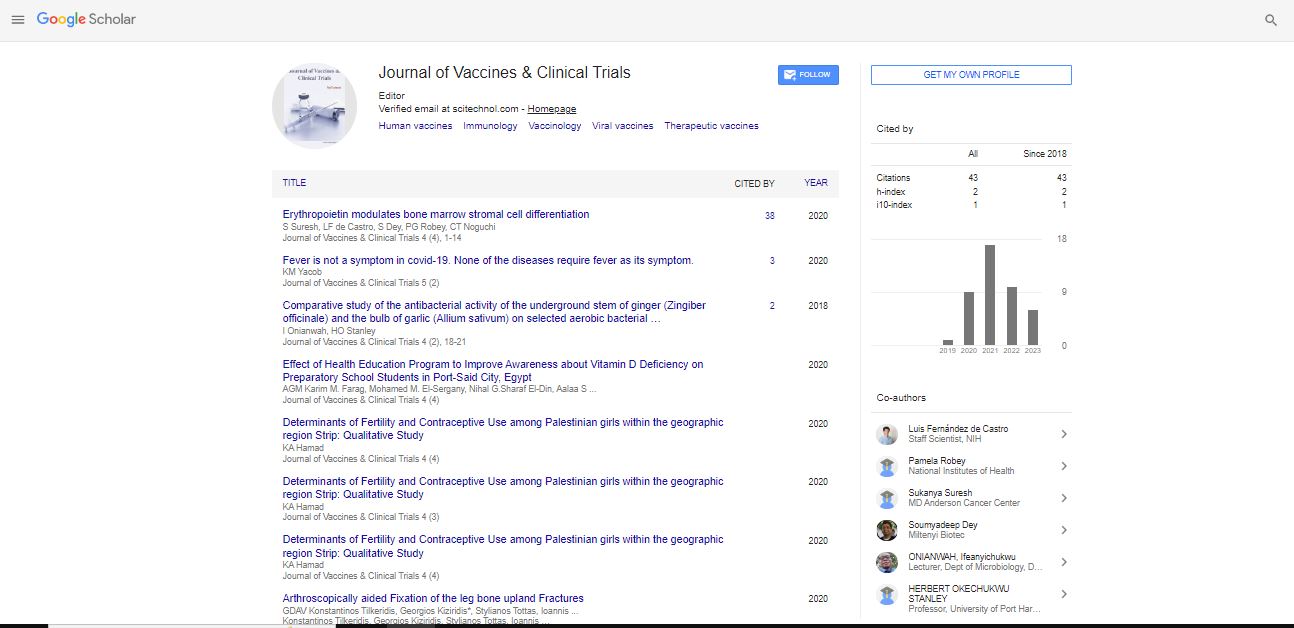Opinion Article, Jou Of Vac Cli Tr Vol: 7 Issue: 2
Vaccine Development: Pre-Market Testing and Evaluation of Safety in Humans and Animals
A. Pry White*
1Centre for Public Health Research, University of Montreal, Montréal, Québec, Canada
*Corresponding Author: A. Pry White,
Centre for Public Health Research, Montreal,
University of Montréal, Québec, Canada
E-mail: whiteprey006@hotmail.com
Received date: 29 May, 2023, Manuscript No. JVCT-23-102731;
Editor assigned date: 31 May, 2023, PreQC No. JVCT-23-102731(PQ);
Reviewed date: 14 June, 2023, QCNo JVCT-23-102731;
Revised date: 21 June, 2023, Manuscript No. JVCT-23-102731(R);
Published date: 28 June, 2023, DOI: 10.4172/JVCT.100072
Citation: White AP (2023) Vaccine Development: Pre-Market Testing and Evaluation of Safety in Humans and Animals. Jou of Vac Cli Tr 7:2.
Description
Vaccines are important component of public health initiatives, providing protection against infectious diseases. Before a vaccine is approved for market distribution, it undergoes a rigorous testing and evaluation process to ensure safety and efficacy. This study provides a comprehensive review of the pre-market testing procedures for vaccines, focusing on safety evaluation in both human subjects and animal models. It explores the various phases of clinical trials, the methods used to assess vaccine safety, and the monitoring of side effects. Understanding the testing process and potential side effects of vaccines is essential for informed decision-making and public confidence in immunization programs.
Vaccine development follows a systematic approach that involves extensive testing and evaluation to ensure safety and efficacy. Premarket testing plays an important role in assessing the potential side effects of vaccines in both humans and animals.
Pre-clinical testing in animals
Before clinical trials in humans, vaccines undergo pre-clinical testing in animal models:
Safety assessment: Animal models are used to assess the general safety profile of the vaccine, including potential toxic effects and immunogenicity.
Efficacy evaluation: Animal studies also provide insight into the vaccine's ability to induce an immune response and protect against the targeted pathogen.
Clinical trials in humans
Clinical trials are conducted in human subjects to evaluate vaccine safety, efficacy, and immunogenicity. They are typically conducted in several phases:
Phase 1: Small-scale studies involving a small number of healthy volunteers focus on evaluating safety, dosage, and immune response.
Phase 2: Expanded trials with a larger participant pool further assess safety, immunogenicity, and preliminary efficacy.
Phase 3: Large-scale trials involving thousands of participants evaluate vaccine efficacy, safety, and adverse events.
Safety evaluation in human clinical trials
During clinical trials, vaccine safety is carefully monitored and evaluated:
Adverse event reporting: Participants are closely monitored for any adverse events following vaccination, and all side effects are documented and reported.
Placebo control groups: Control groups receiving a placebo or an alternative vaccine aid in comparing side effects and determining the vaccine's safety profile.
Safety data analysis: Collected data on adverse events are analyzed to assess the vaccine's safety profile, including the type, frequency, and severity of side effects.
Vaccine side effects in humans
Vaccines can cause side effects, which are typically mild and temporary:
Common side effects: Common side effects include local reactions at the injection site, such as pain, swelling, or redness, as well as systemic reactions like fever, headache, or fatigue.
Rare side effects: Rare but potentially serious side effects, such as allergic reactions or vaccine-associated adverse events, are carefully monitored and investigated.
Post-market surveillance
After a vaccine is approved and enters the market, post-marketing surveillance systems monitor its safety and detect any rare or longterm side effects:
Passive surveillance: Healthcare providers and vaccine recipients are encouraged to report any adverse events voluntarily, allowing for ongoing safety monitoring.
Active surveillance: Active monitoring systems, such as large databases and registries, are employed to track vaccine safety on a population level.
Conclusion
The pre-market testing of vaccines involves rigorous evaluation in both animal models and human clinical trials to ensure safety and efficacy. Adverse events are carefully monitored, and the vaccine's safety profile is assessed. Vaccines may cause side effects, but the benefits of immunization in preventing diseases far outweigh the risks. Robust post-market surveillance systems continue to monitor vaccine safety and address any potential concerns, contributing to public confidence in vaccination programs.
 Spanish
Spanish  Chinese
Chinese  Russian
Russian  German
German  French
French  Japanese
Japanese  Portuguese
Portuguese  Hindi
Hindi 